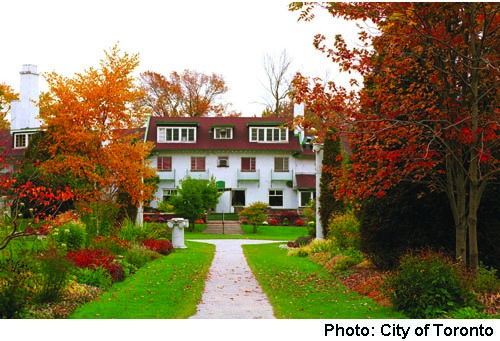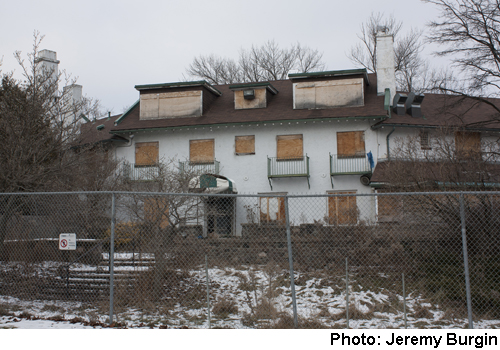
Guild Inn
 The Guild Inn – 201 Guildwood Parkway, Toronto, Ont.—DEMOLITION BY NEGLECT
The Guild Inn – 201 Guildwood Parkway, Toronto, Ont.—DEMOLITION BY NEGLECT
Home to the only Depression-era artists’ colony in Canada, this unique site is in imminent danger of demolition by neglect by the very municipality that designated it. It is caught up in complicated negotiations involving multiple levels of authority.
Why it matters
The Guild Inn was built as a private residence in 1914 in the Arts and Crafts style. The house and surrounding 88 acres of gardens and woodlands were purchased by Rosa Breithaupt Hewetson in 1932. She and husband Spencer Clark—a socially conscious couple—then founded the Guild of All Arts, a co-operative arts and crafts community. They converted stables and garages into studio and workshop space for artists and artisans to live and work in.
The extensive gardens and grounds were transformed by the Clark’s personal building conservation program. Salvaged architectural fragments from demolished buildings in and around Toronto were erected to create a sculpture garden. The Toronto and Region Conservation Authority bought the property for use as a public park in 1978 and the art and sculpture on display became a unique attraction to an exceptional setting atop the Scarborough Bluffs overlooking Lake Ontario.
The City of Toronto’s Culture Division assumed responsibility for the sculpture and architectural fragments in 1996, with the Parks and Recreation Division looking after the Guild Inn and the parkland. The Guild Inn and Studio Building were designated under Part IV of the Ontario Heritage Act in 1999.
 Why it’s endangered
Why it’s endangered
The building has been closed and boarded up since 2001 and is in an advanced state of deterioration due to risks posed by interior water damage, broken windows, mould and vandalism. Since 2008, the 96-room hotel addition built in 1965 has been demolished, and the Studio Building lost to fire.
The City of Toronto has been attempting, unsuccessfully, to redevelop the site for a number of years. In 2005, the City endorsed a hotel/spa redevelopment plan that called for the de-designation and demolition of the Guild Inn, on condition that certain elements of the interior be incorporated into the new design. It also recommended the development of an interpretation strategy and that a conservation plan and heritage easement agreement be entered into. But the project never came to fruition.
Where things stand
Since 2005, the building has suffered further deterioration. Copper pipes were stolen, resulting in major basement flooding. Recent roof repairs do not undo extensive interior damage from water infiltration.
In 2008, the City entered into a partnership with Centennial College, which is looking to invest $30 million in the site – an investment that would include rehabilitating the Guild Inn for use as its Cultural Heritage Institute, and a conference centre and restaurant to train students enrolled in its School of Hospitality, Tourism and Culture. The college recently released changes to its original proposal involving replacing a planned hotel with a 100-unit low-rise senior’s condominium residence. According to Centennial College a feasibility study completed this winter revealed there was little prospect of finding a willing hotelier. The college estimates the condo component could help finance the $6 million in projected restoration costs to the Inn.
Centennial College wants to purchase the 6.3-acre footprint of the original hotel site on behalf of the builder for ease of development, rather than enter into a sub-lease. This will require the approval of the City of Toronto, the Toronto and Region Conservation Authority and the Ministry of Natural Resources. The initial feedback from community groups has been in opposition to any condos on the site.
Complicating the situation is $4.2 million in city funds for cultural precincts around the boarded up Inn, which include gardens, a trail system, lookouts, visitor’s centre and more. The funds will have to be approved again next year due to delays.
In November 2011, the City of Toronto rejected Centennial College's proposal to redevelop the site.
UPDATE: In April 2014, the City of Toronto gave preliminary approval to a proposal to redevelop the Inn, converting it to a restaurant and banquet hall. Dynamic Hospitality and Entertainment plans to demolish later additions, replacing them with a 23,500-square-foot banquet hall. The renovation will see heritage elements in the original house retained and its white stucco façade restored. As of July, 2015, a final agreement has not been signed. Dynamic President Sam D’Ulva told Inside Toronto that the parties were “very close” to an agreement.
UPDATE: In early September, representatives for the City of Toronto and Dynamic Hospitality and Entertainment Group told the Toronto Star that restoration work would begin by the end of the month.
UPDATE: Restoration work began in November. Work is expected to be completed by the end of 2016.
Top 10 Endangered Places
- Explore Past Listings
- National
- British Columbia
- Alberta
- Saskatchewan
- Manitoba
- Ontario
- Our Lady of Assumption Church
- 24 and 28 King Street East, Gore Park
- 24 and 28 King Street East, Gore Park
- Abell
- Alma
- Amherst Island, north-eastern shore of Lake Ontario
- Bala Falls
- Bata
- Davisville Junior Public School/ Spectrum Alternative Senior School
- Districts
- Former Grand Trunk Railways Locomotive Repair Shops
- Gibson Isolation Hospital
- Hamilton Education
- Joachim
- Kingston Collegiate Vocational Institute (KCVI)
- Lister
- Nor’Wester Mountain Range and Loch Lomond Watershed Reserve
- Nottawasaga Lighthouse
- Ontario - Views
- Ontario Place
- Ottawa - Lansdowne Park
- POW Camp 30/Boys Training School National Historic Site
- Petrie Building
- Port Dalhousie
- Somerset House
- The Black Horse Pub and Pig’s Ear Tavern
- Tivoli Theatre
- Views of Legislative Assembly of Ontario Building
- Ontario - Porter/McKinley Block
- Brighton Public School
- Cockshutt
- The Barber Paper Mill
- Bellevue House
- Central Experimental Farm
- Guild Inn
- David Dunlap Observatory and Park
- Riverdale Hospital
- The Old Grand Trunk Railway Station
- Quebec
- New Brunswick
- Nova Scotia
- Prince Edward Island
- Newfoundland and Labrador
- Territories
- Worst Losses Archive
- Nominate a Site
